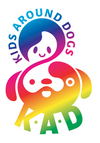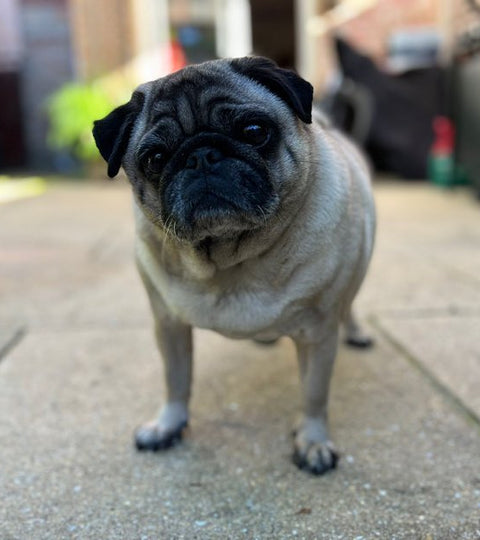Senior dogs around kids
Do you remember that bundle of cuteness your dog was when you adopted him years ago?

He was so young, so new to the world! Curious about everything and so full of energy. At times, that youth drove you insane and you might have even wished time would go by faster and your puppy would turn into an adult dog already.

Time did pass, as it always does, and now you look at that same bundle of cuteness, but he’s all grown up now. Most of his fur has gone grey, his ears don’t hear like they used to, his eyes aren’t as full of light as before, and his legs are weak under his achy and aged body.
Life is different. He no longer has the energy he had before and chances are that his bladder and /or his bowels are also weak, which means he’s back to go toilet in the house, like when he was a puppy. However, now, it’s not a matter of training, but a matter of health.

A proper vet check is always recommended. However, as my vet pointed out to me not long ago about my 10-year-old Pug Wilco, there is no medicine to stop ageing.
Nothing can make my dog young again.
Some medical support can be given to help our senior dogs make life easier, but that’s about it.
An old dog can be in great health, but still get old and there is nothing anybody can do about it.
And while you might need to come to terms with the fact that your dog is old and life for him is different, you also need to make sure the children understand this too.
I feel honesty is the best policy. There is no point hiding what is clearly in front of them, but we need to make sure we explain things in a way that kids can understand, so what you say and how you say it will be age and cognitive abilities dependent.

This is an example of something you could say:
‘Wilco is 10 years old now, which is very old for a dog, especially a pug. Because he is older, he gets pains in his body sometimes. He might do a wee in the house because his body cannot always feel he needs the toilet, and he needs to be left alone more often because he needs to sleep more. Also, he might be in a bad mood sometimes. That’s because old dogs get a bit grumpy. Probably because they get more tired and because of their aches, but he still loves us very much. And because we love him too, we will give him what he needs.’
Engage the child in the conversation by asking her questions to make sure she is following the conversation and understanding what has been said.
After explaining the condition of the dog, why not come up with things the child can do for and around the senior dog?
For example, instead of expecting the dog to play with the child for a long time, why not have some short play-time sessions? Or, even better, ask the child to fill up some toys with treats (like West Paws items) and get the dog to find them.
Your senior dog might be given some gentle exercise to do as a form of physiotherapy. A good one is a big spin, that helps the dog to move his body in a circle, without turning or curving the back too much, so it is more gentle on the body.
Ultimately, it is always about respecting the dog. Teach your child some dog body language, even super basic ones (see our ‘The Language of Dogs Booklet'). For example, you can tell your child that when a dog turns his head away from them, it means ‘no’, so we cannot cuddle him at that time, and we’ll respect his choices and feelings. This is important for kids to see and learn about themselves and other people too. If you want a hug with your child, but she doesn’t want to be hugged, you ought to respect her choice and decision by not hugging her.
In fact, dogs can assist us in teaching children about being respected and respecting others.
If seeing the senior dog getting old is upsetting the child, welcome those feelings. It is ok to be sad, it is ok to cry, but also remind your child how lucky you all are to have had some many years with your dog and how privileged you are to look after him in his old years.
Adopting a dog is a life-long commitment and, often, this means that it’s the life of the dog, not yours.









0 Comments
There are no comments yet. Be the first one to post one!